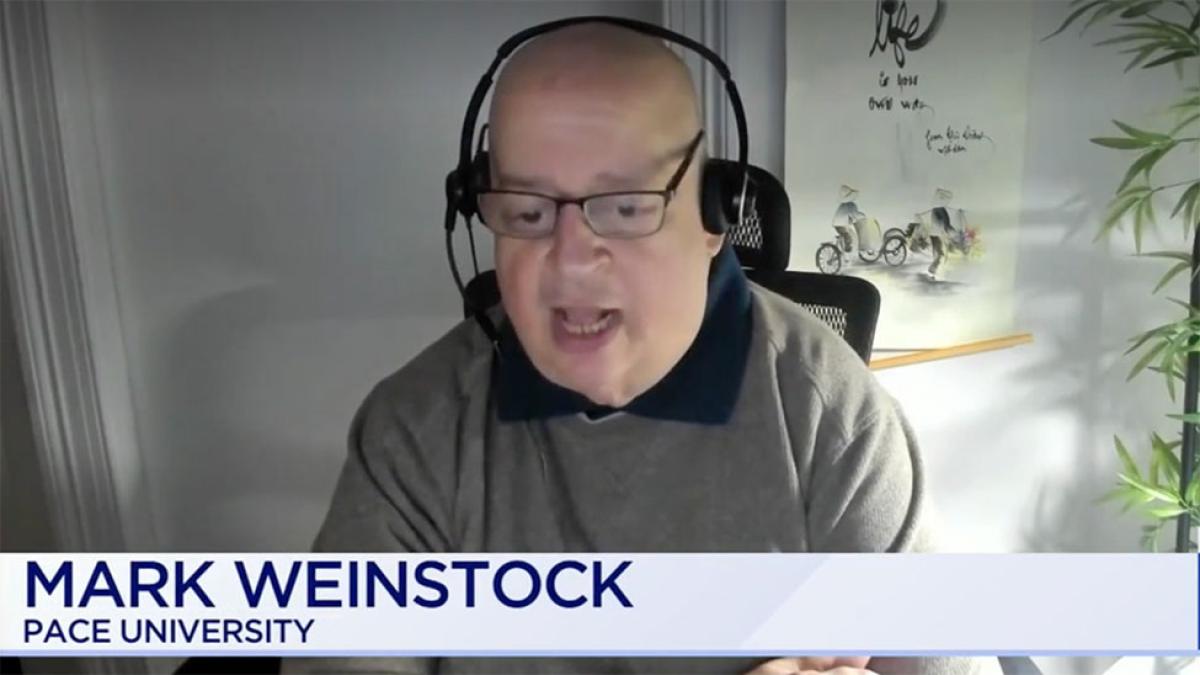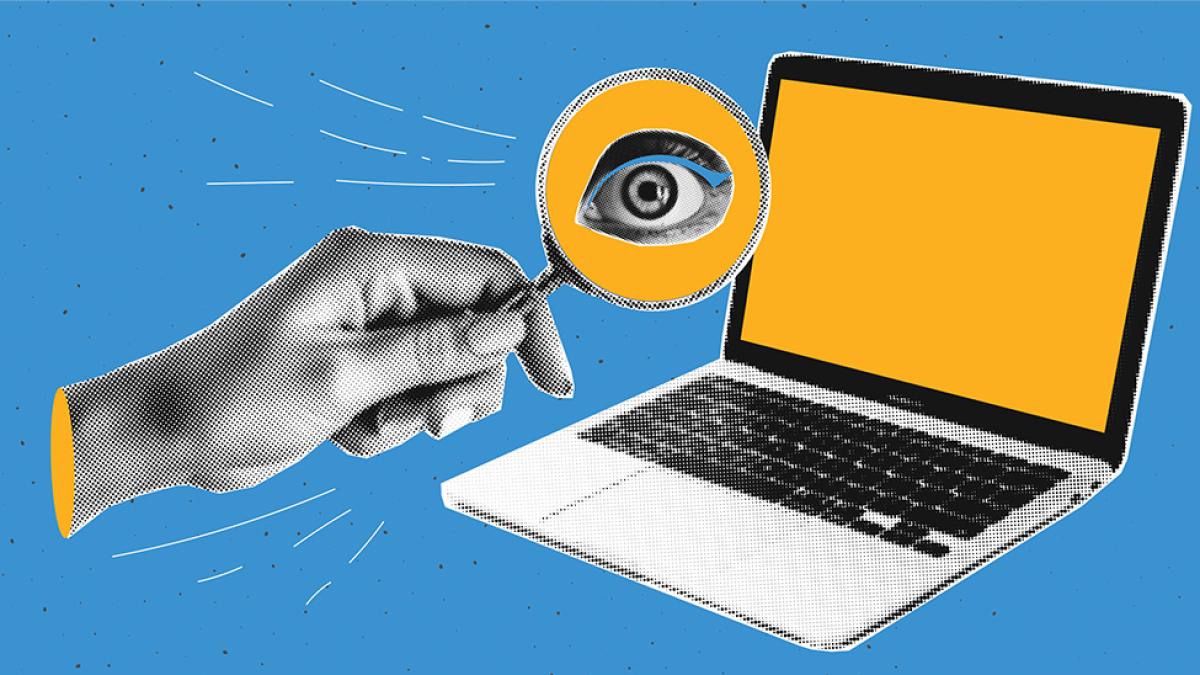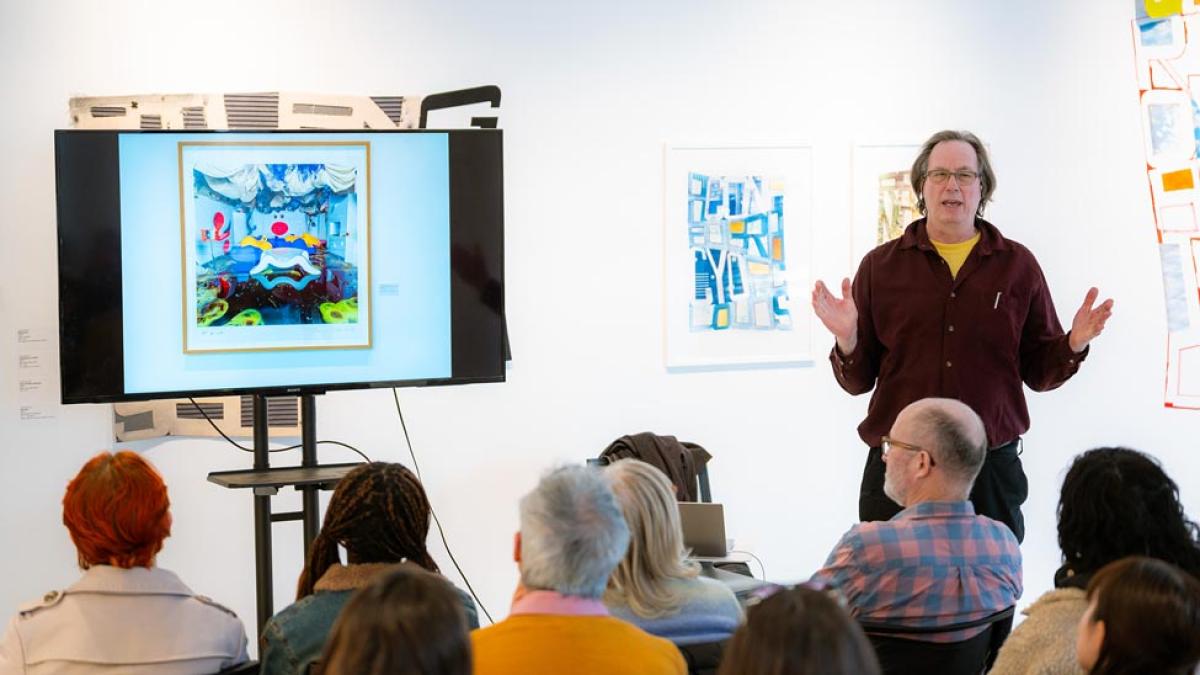With artificial intelligence remodeling how healthcare is researched, and delivered, Pace experts are shaping the technology—and erecting the guardrails—driving the revolution.
Rethinking Education for an AI Future
Pace President Marvin Krislov recently participated in a conversation at Google Public Sector GenAI Live & Labs as part of the Future U. podcast. He joined higher ed leader Ann Kirschner, PhD, and Chris Hein, Field CTO at Google Public Sector, to discuss the evolving role of AI in higher education.
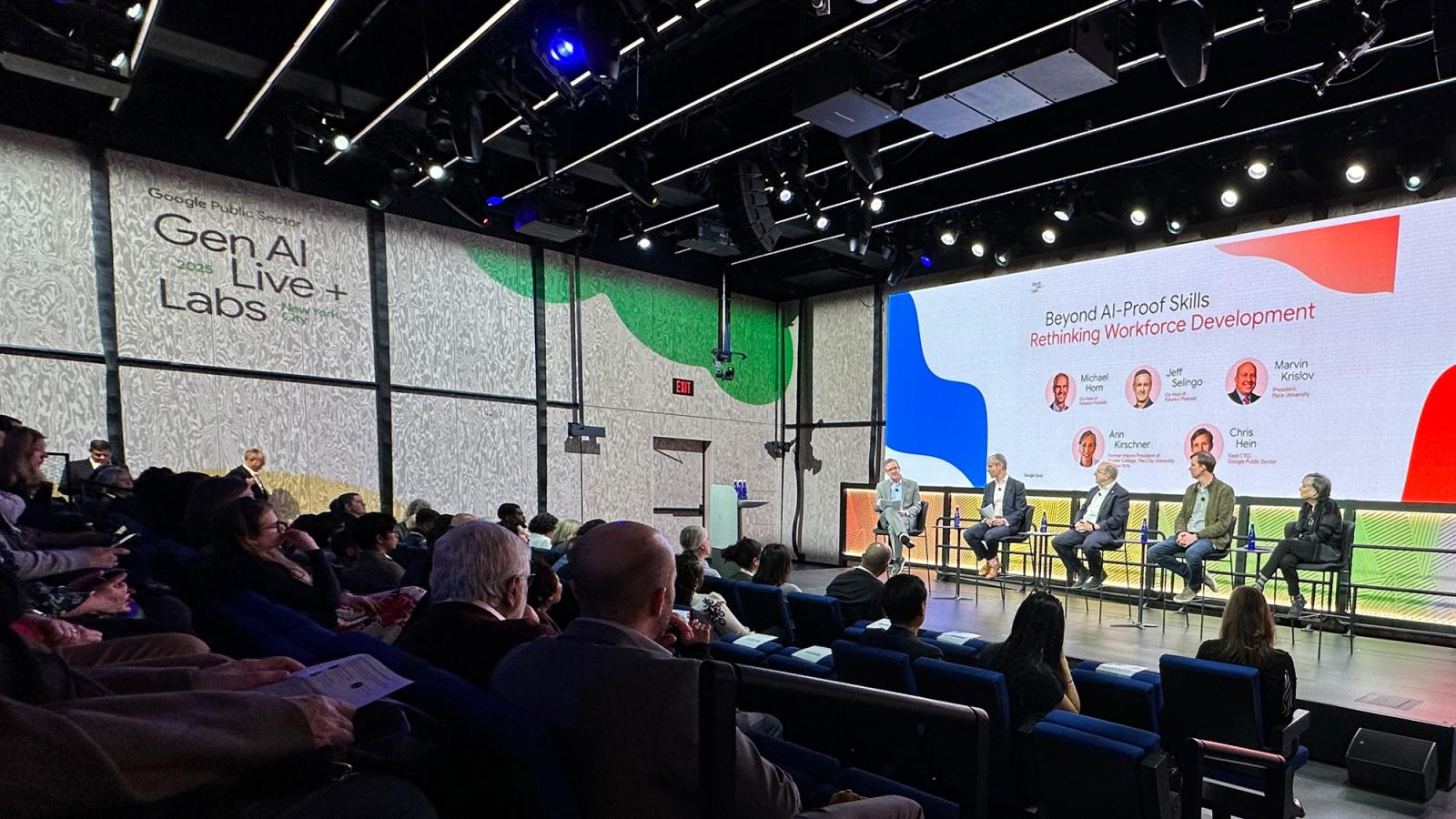
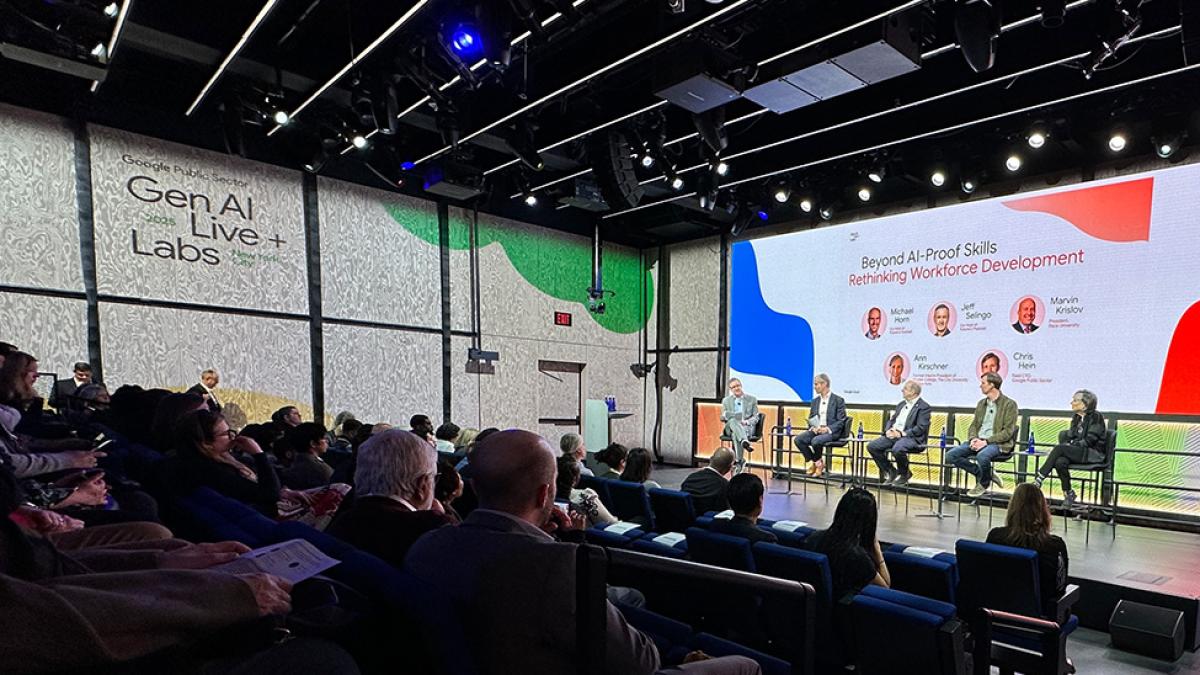
President Marvin Krislov recently joined the Future U. podcast at Google Public Sector GenAI Live & Labs, recorded at Google’s headquarters on Manhattan’s Pier 57. In a conversation alongside Ann Kirschner, PhD, of CUNY and Arizona State University, and Chris Hein, Field CTO at Google Public Sector, Krislov explored the profound impact of AI on higher education and the workforce.
Hosted by Future U.’s Michael Horn and Jeff Selingo, the discussion centered on the need for institutions to develop a strategic approach to AI, its role in shaping the future of work, and the importance of university-industry partnerships in ensuring equitable access to AI-driven education.
Krislov emphasized that AI is not just a passing trend—it requires proactive planning, faculty training, and industry collaboration to prepare students for the evolving job market.
“Pace has always been focused on preparing people for the next step. Thinking about your career, your job, skills, and internships is part of the discussion the minute you enter Pace University,” said Krislov. “When we saw the important change happening with technology and AI, we said, We owe it to our students and our faculty to help them navigate this.”
He highlighted Pace University’s leadership in AI education, including AI-integrated coursework across disciplines, real-world partnerships, and initiatives like the "AI in the Workplace" program. As AI continues to reshape industries, Krislov reinforced that higher education must not just adapt, but lead, ensuring students graduate not just AI-literate, but AI-ready.
More from Pace
Generative AI is reshaping how we create, communicate, and engage with the world—but what do we gain, and what do we risk losing? This thought-provoking guide challenges you to move beyond fear or hype, applying critical thinking to AI’s evolving role in media, creativity, ethics, and society.
Pace University Professor of Art Will Pappenheimer, who has long incorporated digital media and new technologies into his artwork, discusses his latest AI-influenced exhibition and the technology’s effects on the art world.
Navigating AI Responsibly: A Practical Guide from the Pace Library
From privacy risks to environmental costs, the rise of generative AI presents new ethical challenges. This guide developed by the Pace Library explores some of these key issues and offers practical tips to address these concerns while embracing AI innovation.

It’s our new best friend!
It’s the end of critical thought!
It will destroy/revolutionize education!
Many if not most of us are grappling with understanding and learning a suddenly pervasive technology: generative AI (GenAI). Like most new technologies, GenAI carries a load of anxieties along with its benefits, presenting not only skills issues but also wider ethical questions.
Though the death of writing appears to have been exaggerated, there is still plenty to be concerned about during this rapid adoption. Is it possible to use GenAI in a way that feels safe and principled?
Here are a few things you might worry about when using ChatGPT, Claude, Gemini, or any of the array of AI models, and how you might adjust your practices.
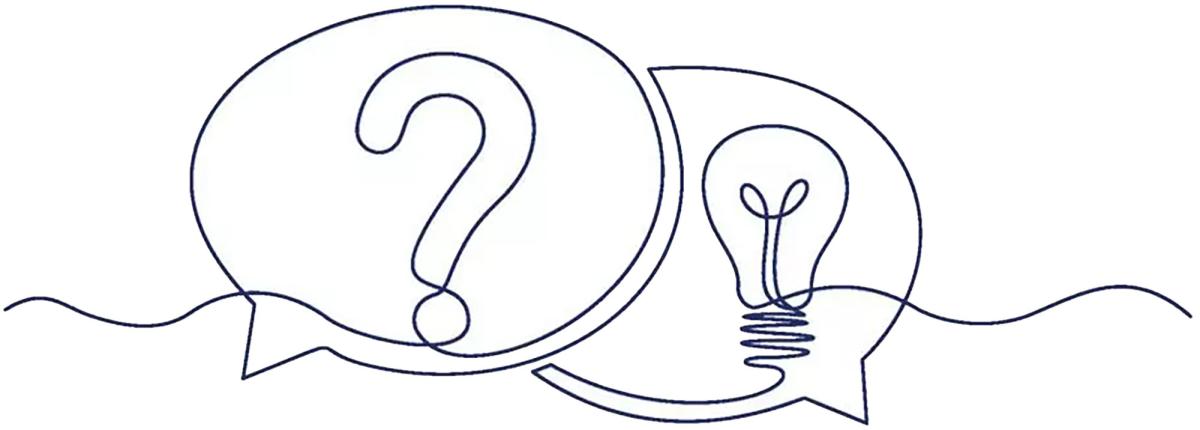
Privacy
Since the advent of GenAI tools, privacy has been an issue. Any info that you put into a GenAI tool—including the content you create, like prompts or material you upload to work on—can theoretically be used to train the AI. If it trains on your work, your work may come out in another user’s output.
Big AI companies usually claim that user information is not used as training material, but their privacy policies and terms of use say otherwise.
An even more obvious privacy problem comes from the fact that AI companies can collect your identity and contact data, IP address (which indicates your location), device and network information, and possibly other information as available to them.
What can I do to safeguard my privacy?
Better safe than sorry. You can proactively opt out of having your data kept and possibly used by an AI company by finding the opt-out process. (Not all US states have opt-out requirements for companies that gather personal data, but enough of them do that there should be a mechanism.) The companies don’t make it easy to locate, but it is usually in the privacy policy or the terms of use.
Environmental Cost
Generative AI is extremely sophisticated and powerful, and it requires sophisticated and powerful computers to run it. These, in turn, demand enormous amounts of energy and water.
It has been estimated by The Washington Post that every prompt entered into a GenAI tool consumes about a bottle’s worth of water. That’s not a lot, but it’s 10 times as much as a Google search, and over the course of a big project, you could end up using a truckload of bottles.
What can I do to reduce AI-induced waste?
Abandoning AI isn’t the answer. Even the greenest among us are using resources all the time—simply by being alive—and it’s possible that AI will be able to reduce our energy use in the long run. For now, while the short-term costs are high, the best thing you can do is be efficient about how you use it.
Learn how to write good prompts (you can use LinkedIn Learning through Pace ITS or review Pace’s resources on prompting), think them out beforehand, and you’ll need to use fewer of them.
Loss of Skills
This is the one that probably worries us, as university affiliates, the most. We’re in the business of teaching and learning; what happens when we outsource planning, writing, even drawing to AI? It seems like uniquely human abilities—critical thinking, logical planning, creativity—can’t help but atrophy.
What can I do to make sure my skills stay sharp?
Don’t panic. ChatGPT may be able to produce 500 readable words that address a topic, but truly useful content requires a lot of human intervention. AI doesn’t do your weightlifting for you; it’s the gym equipment that makes it easy and convenient for you to do the weightlifting yourself.
As a result, those high-level intellectual skills are still very much required to get good results out of GenAI. A prompt that produces what you want must be planned and broken down, step by step, and written carefully with attention to detail and subject-specific knowledge.
Conclusion
These aren’t the only issues with AI, and these suggestions aren’t the only ways to improve your relationship with AI. But, if you’re a member of the Pace Community, the Pace Library can help you with specific questions, instruction, class policies, and more. Ultimately, it’s up to each of us to balance these ethical challenges with AI’s potential, ensuring AI is used effectively, thoughtfully, and responsibly.
For more information, check out the Pace Library’s faculty and student guides to AI, or set up an appointment with a librarian in NYC or Westchester.
As artificial intelligence seeps into every facet of life, Pace scholars are working to harness the technology’s potential to transform teaching and research. While the road ahead is fraught with uncertainty, these Pace experts see a fairer and safer AI-driven future.
Pace University Professor of Art Will Pappenheimer, who has long incorporated digital media and new technologies into his artwork, discusses his latest AI-influenced exhibition and the technology’s effects on the art world.
With artificial intelligence remodeling how healthcare is researched, and delivered, Pace experts are shaping the technology—and erecting the guardrails—driving the revolution.
Seidenberg’s Deep Learning Afternoon with Thunder Compute
The Seidenberg School of Computer Science and Information Systems’ Pace Data Science Club recently hosted an exciting and informative event featuring Thunder Compute, a Y-Combinator-backed pioneering company in GPU cloud computing.
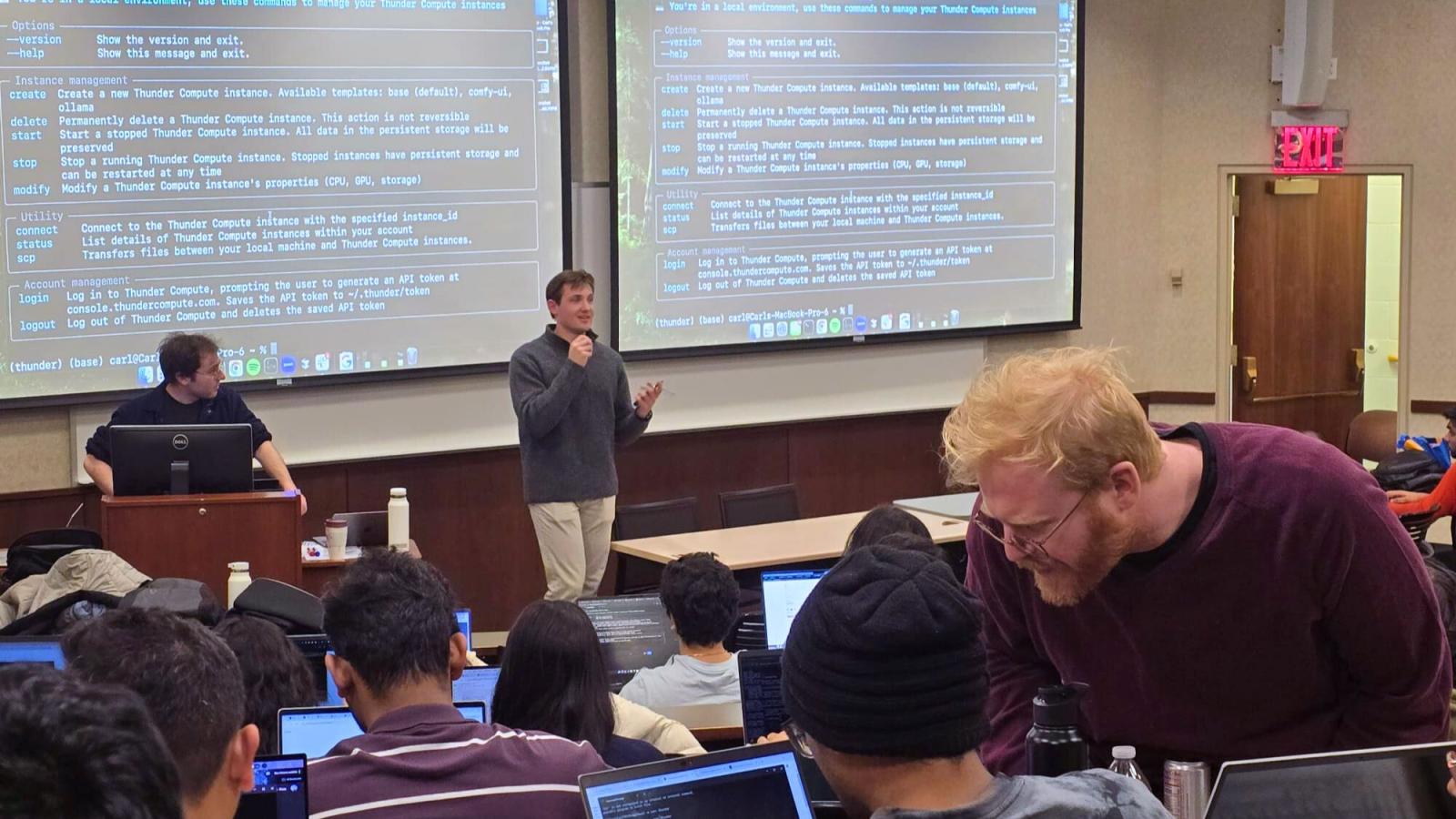
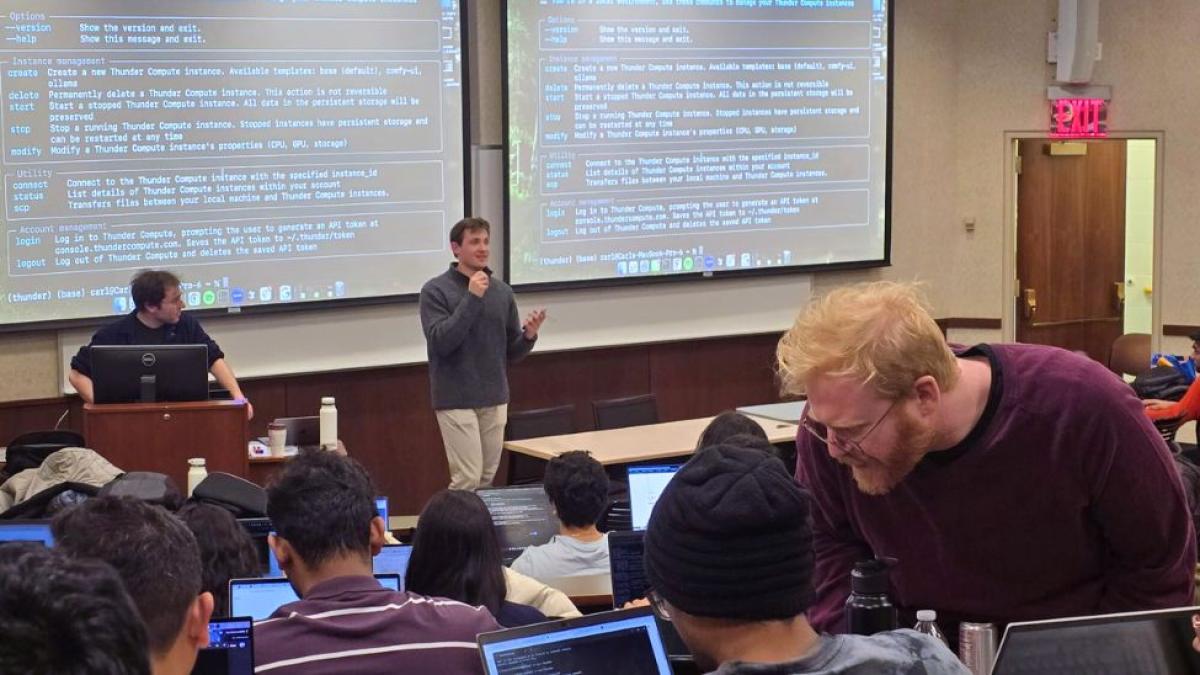
The Seidenberg School of Computer Science and Information Systems’ Pace Data Science Club recently hosted an exciting and informative event featuring Thunder Compute, a Y-Combinator-backed pioneering company in GPU cloud computing. Co-founders Carl Peterson and Brian Model joined Pace students to share insights into their cutting-edge technology and its impact on the future of deep learning.
Thunder Compute is known for revolutionizing the deep learning landscape with its GPU virtualization technology, which powers a highly efficient cloud platform and makes user access to powerful GPUs significantly more accessible.
During the event, the co-founders provided an in-depth look into their innovative platform before guiding students through a hands-on installation process. Their interactive approach ensured that attendees received personalized support and had their questions addressed effectively. The session aimed to demystify GPU virtualization and provide students with firsthand experience in setting up and utilizing powerful cloud-based compute instances.
As part of the event’s hands-on session, participants ran a deep learning model script developed by the Pace Data Science Club. By leveraging Thunder Compute’s GPU acceleration, students were able to experience the significant performance improvements firsthand, reinforcing the advantages of such a solution for deep learning applications.
Throughout the session, students actively engaged with the co-founders in discussions about the evolving landscape of cloud-based GPU computing, particularly in data science and machine learning. These conversations highlighted the growing significance of cost-efficient, high-performance solutions in the industry, reinforcing Thunder Compute’s unique value proposition. The dialogue also explored broader industry trends, including AI model training, scalability challenges, and the future of cloud-based infrastructure.
The event concluded with a heartfelt expression of gratitude to Carl and Brian for traveling to New York to share their expertise and connect with Pace students. Their visit provided a valuable opportunity for attendees to gain hands-on experience while expanding their professional networks in the tech industry. With the rapid advancements in AI and machine learning, events like these serve as crucial learning experiences, empowering students with the knowledge and skills necessary to navigate the evolving landscape.
Haub Law's Trial Advocacy Team Advances to ICC Moot Court Competition in The Hague
On March 8–9, 2025, the Elisabeth Haub School of Law at Pace University hosted the 2025 Regional Round for the Americas and the Caribbean of the International Criminal Court Moot Court Competition (ICC Moot). The event brought seven teams to Haub Law, with the top US teams qualifying for the global ICC Moot Court Competition held annually in The Hague, Netherlands. This year, Haub Law’s team qualified as a finalist and will be traveling to The Hague in June.
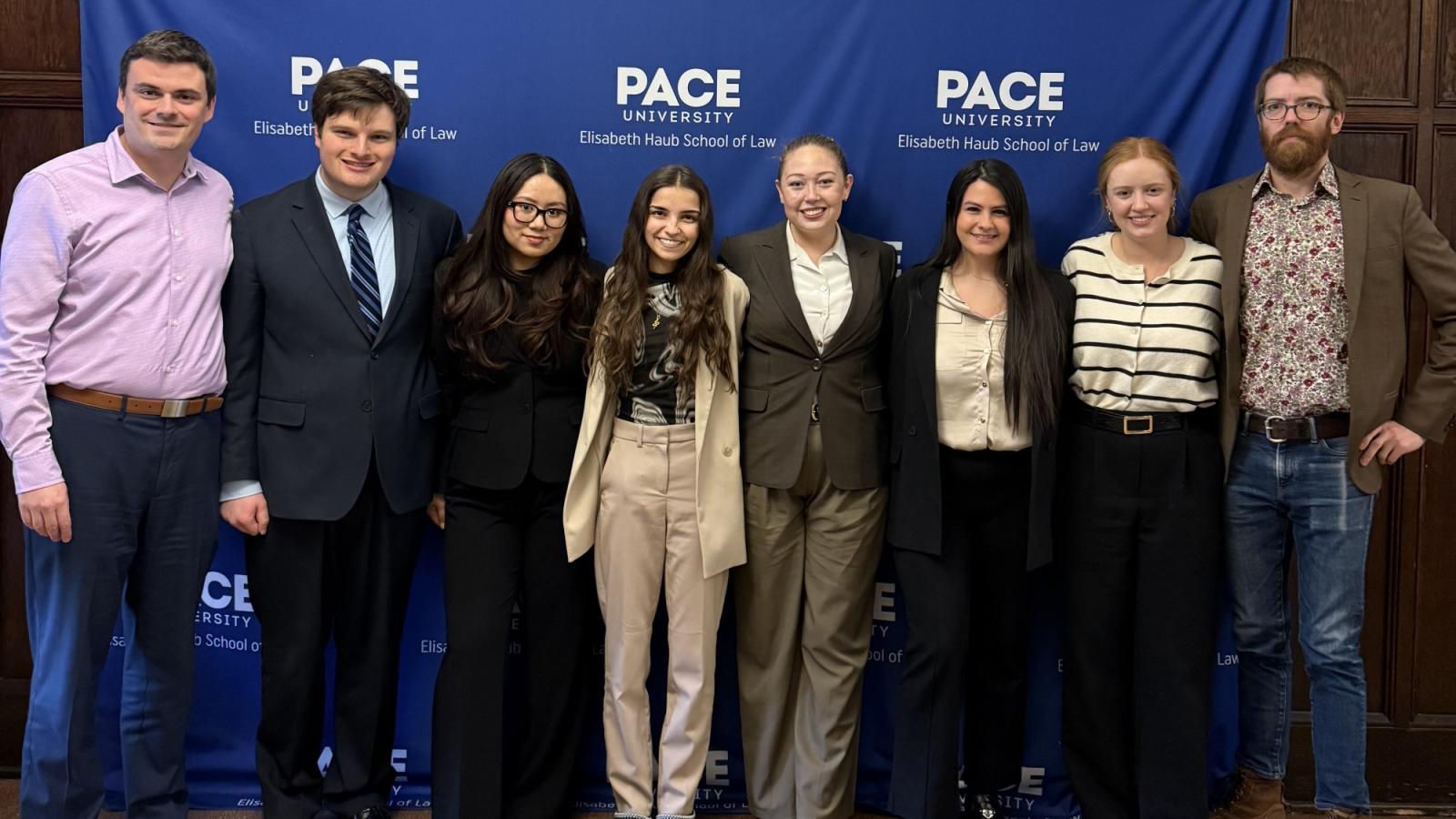
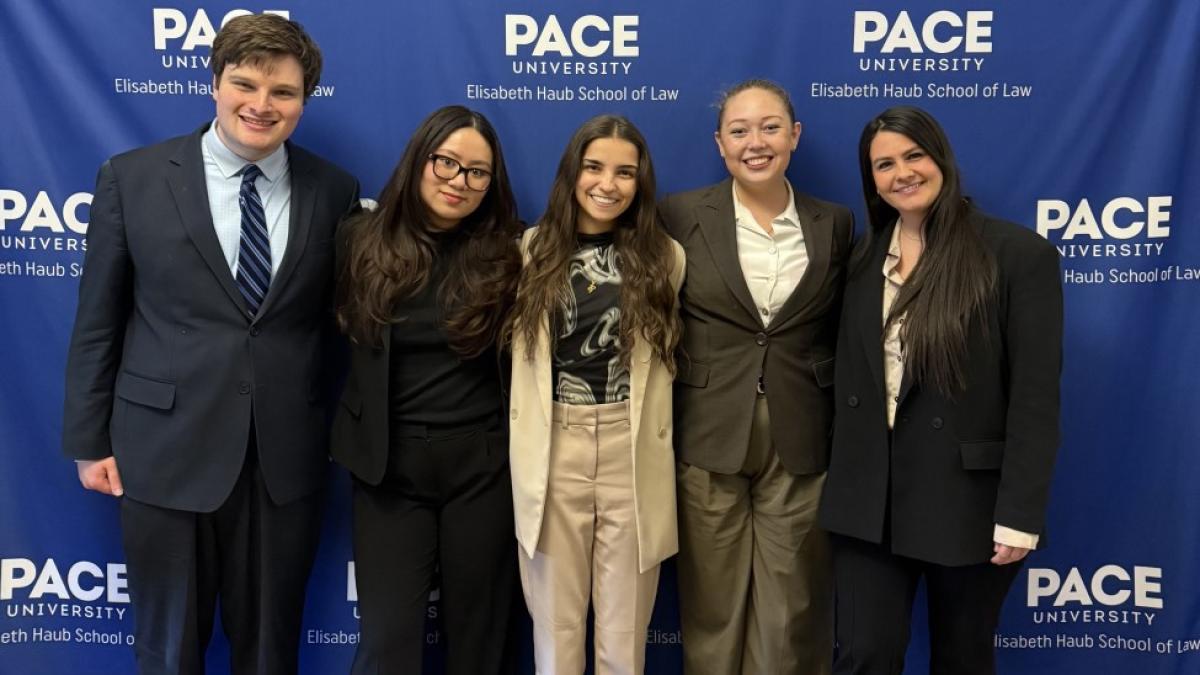
On March 8–9, 2025, the Elisabeth Haub School of Law at Pace University hosted the 2025 Regional Round for the Americas and the Caribbean of the International Criminal Court Moot Court Competition (ICC Moot). The event brought seven teams to Haub Law, with the top US teams qualifying for the global ICC Moot Court Competition held annually in The Hague, Netherlands. This year, Haub Law’s team qualified as a finalist and will be traveling to The Hague in June.
“Haub Law’s team was impressive in the qualifying rounds,” said Bradford Gorson ’13, one of the team’s coaches. “Each student prepared diligently for this competition and the results are reflective of that.” The Haub Law team consists of 3L Priscilla Holloway, 2L Sophie Bacas, 2L Jacob Cannon, 2; Tenzin Lhamo, and 2L Victoria Perretti. The team was coached by two Haub Law alumni, Bradford Gorson ’13 and Steph Areford ’24, along with David Anderson. In addition to the team advancing, Sophie Bacas was awarded first place in the Best Prosecutor category for her performance during the competition.
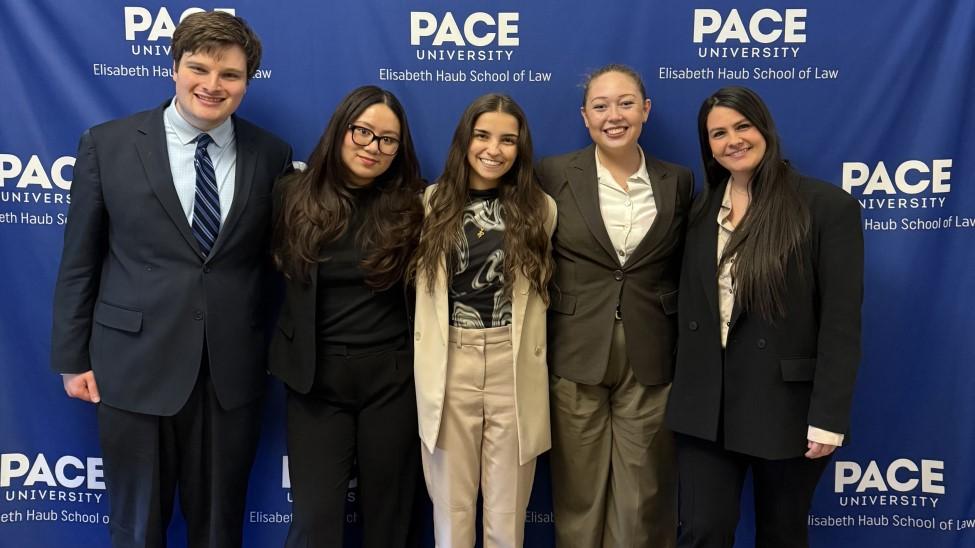
“Our team dedicated seven months of rigorous preparation to this competition, and the journey was nothing short of challenging—especially since none of us had prior experience with the ICC,” said 2L Tenzin Lhamo. “However, with the guidance of our exceptional coaches, Bradford Gorson, David Anderson, and Steph Areford, we were able to rise to the challenge.” Notably, alumni coach Bradford Gorson was part of the Haub Law team that competed in The Hague 12 years ago.
“Haub Law founded the ICC Moot and as it has grown into a global competition we now host the qualifying round for American teams hoping to compete in The Hague,” said Professor Alexander K.A. Greenawalt, who serves as faculty director of the Moot. “It is wonderful to have a Haub Law team advancing once again to the global competition.” The Elisabeth Haub School of Law at Pace University is home to a top ranked trial advocacy program. In 2024, it was ranked #13 in the nation by U.S. News & World Report, placing it impressively among the top 10% of schools nationwide.
The ICC Moot was first organized in 2004 by Haub Law Professor Emeritus Gayl S. Westerman and Matthew E. Brotmann. At the time, the moot was the world’s only moot court competition based on the law and procedures of the newly created ICC, the first permanent international tribunal dedicated to the prosecution of international criminal offenses. Since 2004, the International Criminal Court (ICC) has grown, and the Competition has grown with it. In 2014, Haub Law partnered with the International Criminal Court and the Grotius Centre for International Legal Studies, Leiden University to create a global competition, the ICC Moot Court Competition, which is held annually in The Hague, Netherlands, with the final round judged at the ICC itself by ICC judges and legal officers. More recently, in 2017, the ICC Moot started its collaboration with the International Bar Association (IBA), and in 2020 the IBA became a name partner in the Competition.
This year, the five top US teams were the University of Chicago, Georgetown University Law Center, Case Western Reserve University School of Law, Elisabeth Haub School of Law at Pace University, and Tulane University School of Law. These top five teams all qualified for the International Criminal Court Moot Court Competition to be held in June in The Hague.
2025 Regional Qualifying Round for the Americas and Caribbean results
Best Overall
- First: University of Chicago
- Second: Georgetown University Law Center
- Third: Case Western Reserve University School of Law
Best Preliminary Round Oralists – Prosecution
- First: Sophie Bacas, Elisabeth Haub School of Law at Pace University
- Second: Jade Armstrong, University of Miami School of Law
- Third: Kaylara Benfield, Case Western Reserve University School of Law
Best Preliminary Round Oralists – Defense
- First: Inanna Khansa, University of Chicago
- Second: Rose Leakin, Case Western Reserve University School of Law
- Third: Luke Dykowski, Georgetown University Law Center
Best Preliminary Round Oralists – Victims’ Advocate
- First: Vikram Ramaswamy, University of Chicago
- Second: Haley Dykstra, Tulane University School of Law
- Third: Minah Malik, University of Miami School of Law
Best Prosecutorial Memorial
- First: Georgetown University Law Center
- Second (TIE): Tulane University School of Law
- Second (TIE): Case Western Reserve University School of Law
Best Defense Memorial
- First: Case Western Reserve University School of Law
- Second: Georgetown University Law Center
- Third: University of Miami School of Law
Best Victims’ Advocate Memorial
- First: Case Western Reserve University School of Law
- Second (TIE): University of Miami School of Law
- Second (TIE): Georgetown University Law Center
Semifinalist Teams
- University of Chicago
- Georgetown University Law Center
- Case Western Reserve University School of Law
- Elisabeth Haub School of Law at Pace University
- Tulane University School of Law
Participating Teams
- Case Western Reserve University School of Law
- Elisabeth Haub School of Law at Pace University
- Georgetown University Law Center
- Tulane University School of Law
- University of Chicago
- University of Miami School of Law
- Chicago-Kent College of Law
Op-ed: Higher Education Drives New York's Economic And Social Vitality
Pace President Marvin Krislov writes an op-ed with Jessica Lappin of the Downtown Alliance in Crain's New York Business, emphasizing the critical role of higher education in sustaining New York City's economic and social well-being.
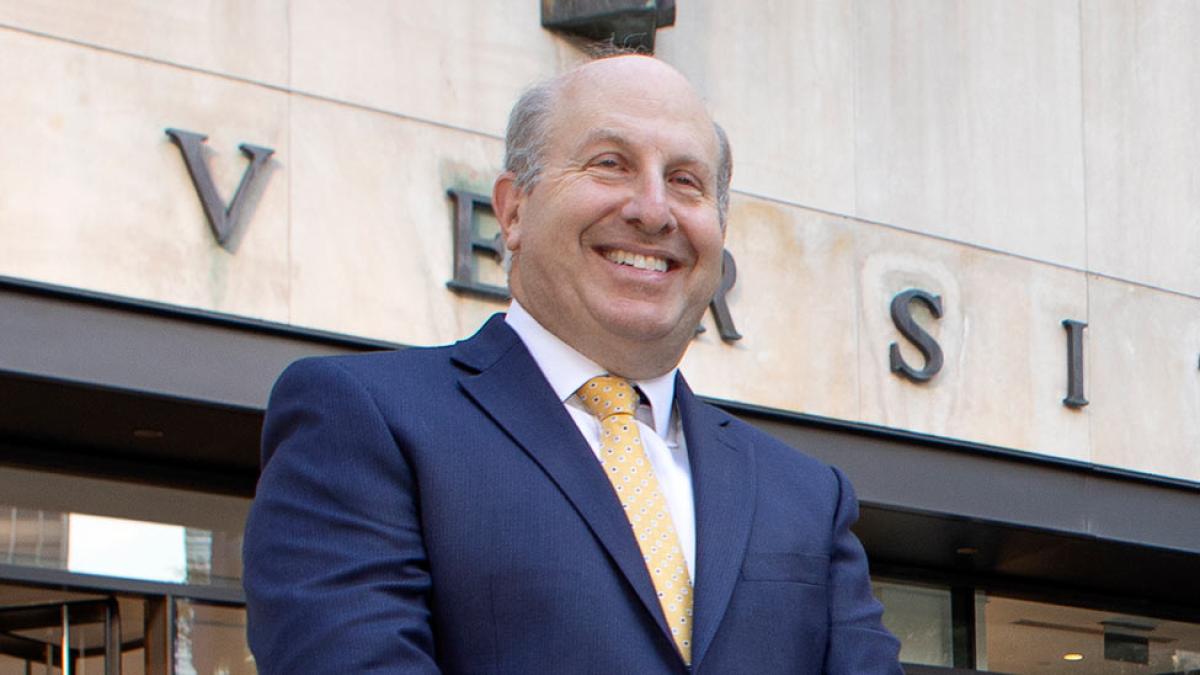
Fox 5 News: Professor Bennett Gershman on Babylon Village Retail Gun Store Ban
Haub Law Professor Bennett Gershman speaks to Fox 5 News about the controversial law enacted in Babylon Village, New York which bans the sale of firearms and ammunition within its borders, saying it could be viewed as unconstitutional.
Who Will Be New York City’s Next Cellino & Barnes?
Larry Chiagouris, a professor of marketing at Pace University, said that because most people don’t pay attention to law firm advertisements, firms need to be creative. “Offer up language that has not been seen 100,000 times before,” he said. “I think it's important to know that law firms typically won't use this language in court or before a judge.”

After Suffolk Fires, 'Vibrant Regeneration' Predicted For Burned Areas
Environmental Science Professor Matthew Aiello-Lammens provides insight to Newsday on post-fire regeneration efforts in Suffolk County, explaining how dwarf pitch pines rely on fire to disperse seeds and restore biodiversity.
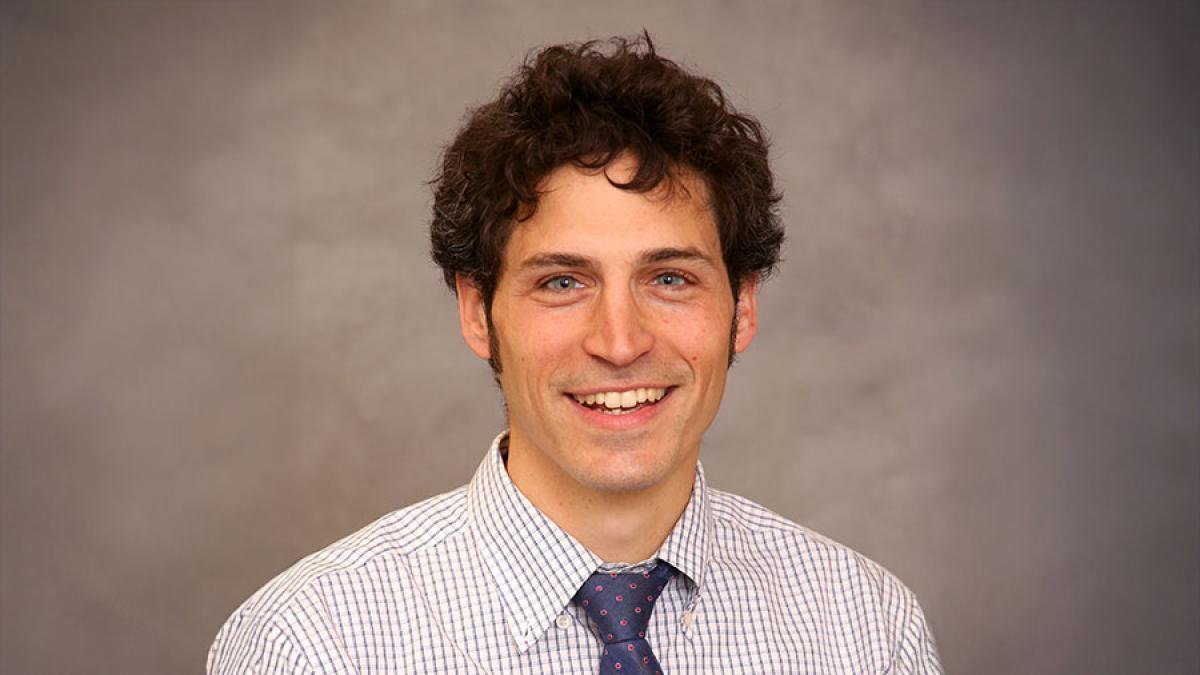
Save a Life, Get a Win, Serve Your Country: Pace's Kieran Hagan's Epic Gameday
Pace men’s lacrosse player Kieran Hagan made headlines for saving a man’s life just before a game, later leading the Setters to victory against Georgian Court, Inside Lacrosse reports.
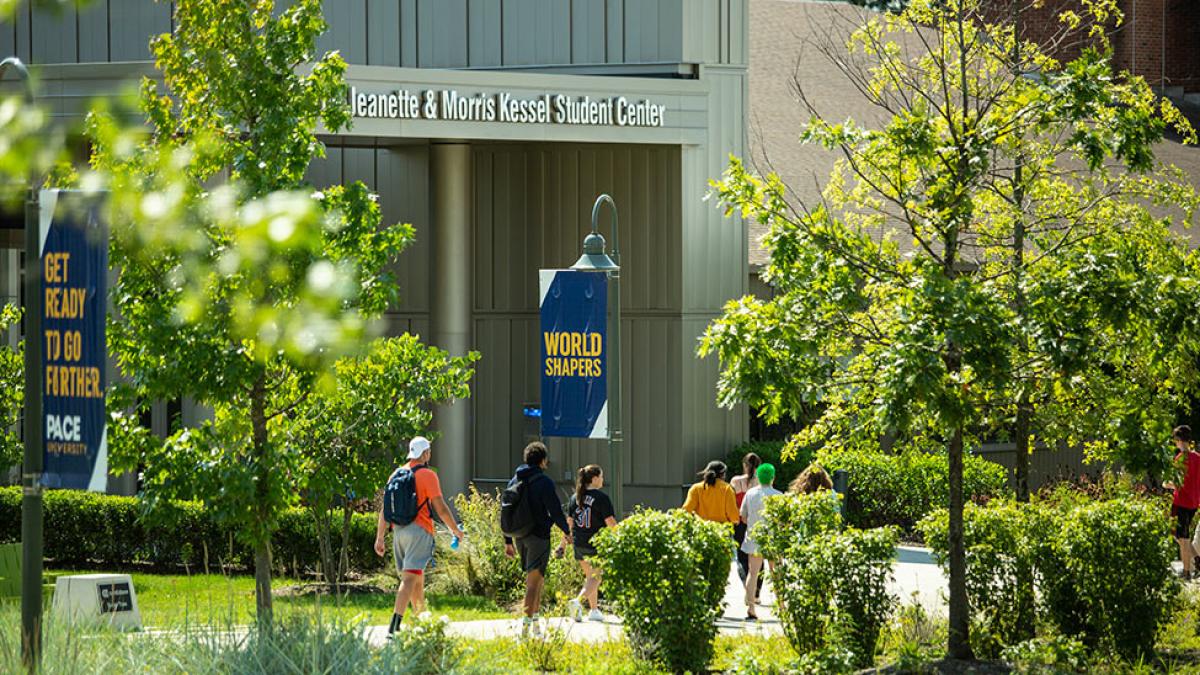
Are We On The Verge Of A Recession?
Economics Professor Mark Weinstock appears on PIX11, examining tariffs and the economy while addressing concerns about a potential recession.
